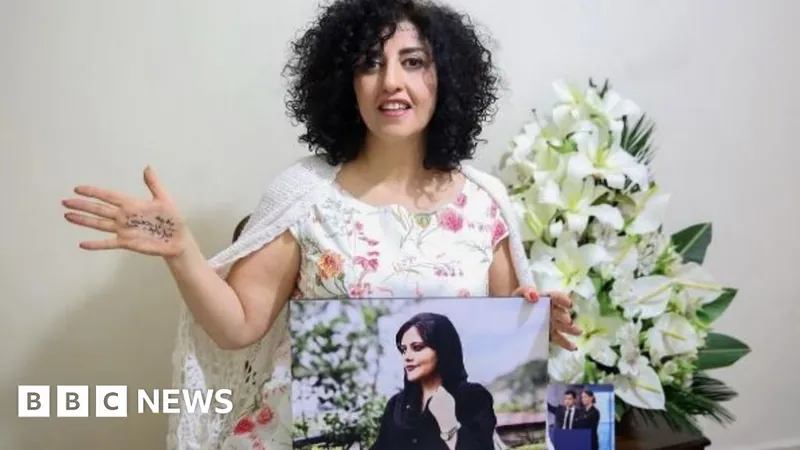
Iranian Nobel Peace Prize Winner Narges Mohammadi Temporarily Released Amid Health Concerns
2024-12-04
Author: Emma
Temporary Release Due to Health Issues
In a significant but bittersweet turn of events, Iranian women's rights activist and Nobel Peace Prize laureate Narges Mohammadi has been temporarily released from prison for a critical three-week period due to medical necessity. This development comes after Mohammadi, 52, underwent surgery to remove a tumor – a pressing health issue that her family and supporters have highlighted for months.
Legal Confirmation and Family's Concern
Her lawyer, Mostafa Nili, confirmed that the prosecutor's office had granted this temporary reprieve based on medical advice. Unfortunately, this short suspension has been criticized by her family as "too little, too late," as they advocate for her permanent release. Mohammadi's detention in Tehran's infamous Evin prison began in 2021, and during this time, she has become a powerful symbol of resistance against the Iranian regime's oppression of women and human rights.
Post-Release Reaction
Shortly after her release, a poignant video on Mohammadi's Instagram captured her being wheeled out of an ambulance on a stretcher, rallying for change with the powerful phrase "Woman, Life, Freedom," a slogan that has echoed throughout Iran during the recent protests sparked by the tragic death of Mahsa Amini, a 22-year-old woman who died in police custody.
Health and Family Updates
The footage showed Mohammadi with her right leg heavily bandaged, cradling a picture of Amini, demonstrating her resolve and connection to the ongoing struggle for women's rights in Iran. Her husband, Taghi Rahmani, described her as maintaining a strong spirit despite her physical fragility, while their 18-year-old son Ali mentioned an emotional phone call where she expressed her love and indicated her compliance to leave prison without the compulsory veil.
International Support for Mohammadi
International voices have rallied for Mohammadi's immediate and unconditional release. Jorgen Watne Frydnes, head of the Norwegian Nobel Committee, urged Iranian authorities to end her imprisonment and ensure her access to appropriate medical care. A representative from the UN Human Rights Office described her release as "important" while reiterating their calls for the freedom of all individuals in Iranian prisons who are detained for exercising their rights to expression.
Ongoing Health Concerns
Despite this temporary relief, her health remains a serious concern, as reported by the Narges Mohammadi Foundation. Following a hospitalization due to a bone lesion suspected of cancer, she was returned to prison just 48 hours later, contrary to her doctors' recommendations. Since her return, Mohammadi has reportedly experienced severe complications, including worsening bedsores and intensified pain.
Foundation's Critique of Medical Furlough
The foundation, advocating for her health and freedom, criticized the medical furlough as insufficient, stating that a longer recovery period of at least three months is necessary for Mohammadi to heal properly. According to their statement, the current arrangement means she will serve an additional 21 days in prison post-release, compounding her sentence unnecessarily.
Recognition of Activism
Narges Mohammadi's fierce activism has not gone unrecognized; she was awarded the Nobel Peace Prize in 2023 for her relentless advocacy for women's rights in Iran. At the award ceremony, her teenage children courageously accepted the honor on her behalf, reading a poignant message that she had secretly communicated from prison: "The Iranian people, with perseverance, will overcome repression and authoritarianism."
A History of Resistance
Mohammadi’s activism is not a new development; she has a notable history of resistance against the Iranian regime, having been arrested 13 times, tried five times, and sentenced to more than three decades behind bars, alongside numerous lashes. Her story is one of resilience and courage, reflecting the ongoing struggle for human rights within Iran and beyond.
Conclusion
As supporters and international communities continue to raise their voices for her permanent release, Narges Mohammadi remains a beacon of hope and tenacity against authoritarianism in Iran.









 Brasil (PT)
Brasil (PT)
 Canada (EN)
Canada (EN)
 Chile (ES)
Chile (ES)
 España (ES)
España (ES)
 France (FR)
France (FR)
 Hong Kong (EN)
Hong Kong (EN)
 Italia (IT)
Italia (IT)
 日本 (JA)
日本 (JA)
 Magyarország (HU)
Magyarország (HU)
 Norge (NO)
Norge (NO)
 Polska (PL)
Polska (PL)
 Schweiz (DE)
Schweiz (DE)
 Singapore (EN)
Singapore (EN)
 Sverige (SV)
Sverige (SV)
 Suomi (FI)
Suomi (FI)
 Türkiye (TR)
Türkiye (TR)